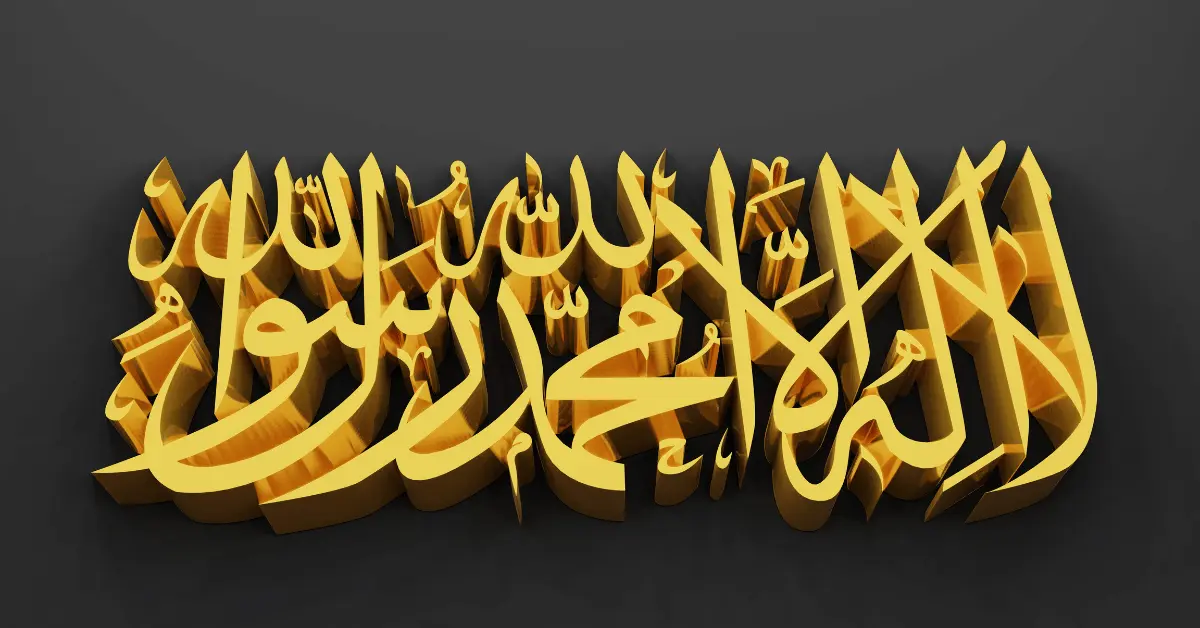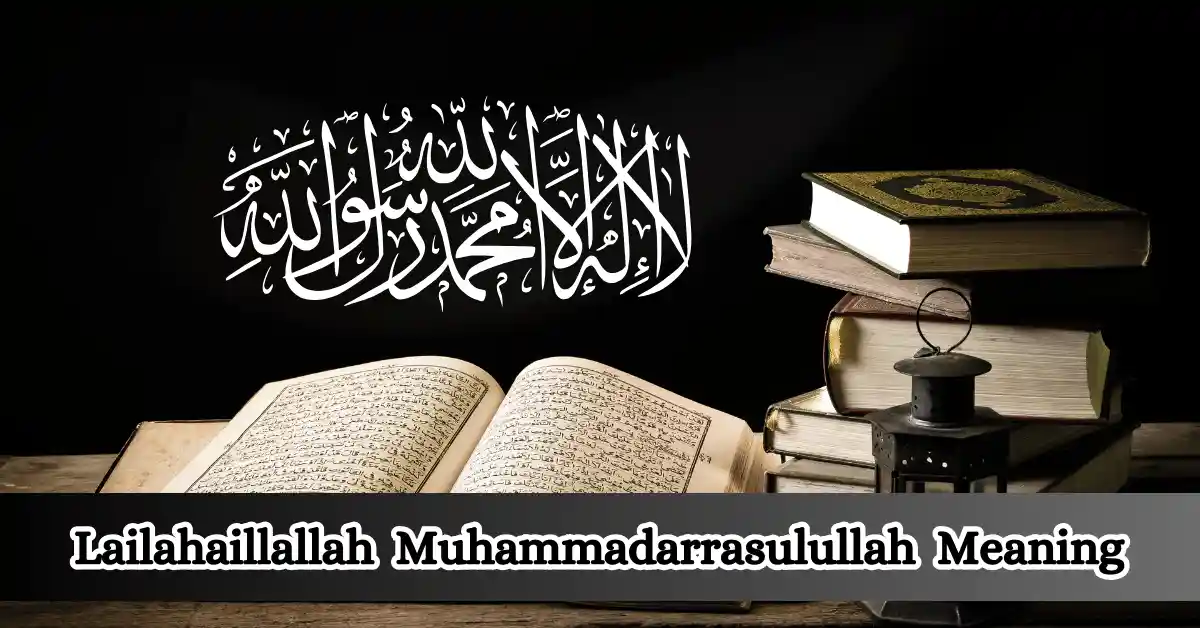“La ilaha illallah, Muhammadur Rasulullah” (لا إله إلا الله محمد رسول الله) is the declaration of the Islamic creed, known as the Shahada. It is one of the fundamental tenets of Islam and serves as a testimony to the oneness of Allah and the prophet hood of Muhammad (peace be upon him).
Do you know what it takes to become a Muslim? To become a Muslim, one must first give two testimonies with the conviction of language and heart.
- La ilaha illallah (لا إله إلا الله): One testimony is to be one Allah, He is the true God. He has no partner.
- Muhammadur Rasulullah (محمد رسول الله): The second testimony is to be the last messenger of Prophet Muhammad.
- Translation: “There is no god but Allah, and Muhammad is the messenger of Allah.”
Lailahaillallah Muhammadarrasulullah Meaning
These two testimonies are called Aqeedah Tawheed. It should also be noted that even if God is accepted as one, but Prophet Muhammad is not accepted as the last Prophet, man cannot become a Muslim. The condition for becoming a Muslim is to acknowledge the oneness of God at the behest of the Prophet.
Allaah says :
- “And your God is One God. There is no god but He. He is the Most Merciful, the Most Compassionate.” (Al-Baqarah, 2: 163)
- “Do you really testify that there are other gods with Allah? Say: I do not bear witness (to it). Say: There is only One God, and I am clear of (all) that you associate (with Him).” (al-name, 6:19)
- “And do not worship with Allah any other (self-made) deity. There is no deity worthy of worship except Him. Everything is mortal except Him.” (al-Qasas, 28: 88)
Lailahaillallah Muhammadarrasulullah in Arabic

Lailahaillallah Muhammadarrasulullah Arab with English
لَا إِلَٰهَ إِلَّا ٱللَّٰهُ مُحَمَّدٌ رَسُولُ ٱللَّٰهِ
“There is no one worthy of worship except Allah and Muhammad is the Messenger of Allah”
Explanation
Hazrat Abo Horaira says that Hazrat Muhammad (PBUH) said: Renew your faith. It was said: Ya Nabi! How do we renew our faith? He said: “There is no god but Allah.” Say as much as you can.
Whoever says Lailahaillallah will be admitted to Jannah.
The Holy Prophet (saw) said: Hazrat Mosa said: O my Allah! Teach me a word by which I will remember you and pray to you. Allah Almighty said Say: “There is no god but Allah .” He said: O my Lord! Of course, there is no god but you, but I want a word that is special to me. Allah Almighty said: Ya Musa! If the seven heavens and their seven inhabitants besides me and the seven earths are on one scale and “La ilaha illa Allah” is another, then “La ilaha illa Allah” will be heavier than.
Hazrat Muhammad (PBUH) says: On the Day of Resurrection, Allah will select and separate one person from my ummah, then ninety-nine offices of sins will be opened before him. Each office will be as big as the human eye can see, and then it will say: Do you deny any of it? Did the guardian angels who wrote me wrong you?
He will submit: No! Allah will say: Do you have anything to answer? He will submit.: No, (there is no excuse) Allah will say: Yes, we have a good deed of yours, today you will not be wronged. Then, a piece of paper will be taken out on which the word Shahadat will be written.
Allah Almighty will say: Come to the balance. He will say: O Allah! What is the status of this little paper in front of these offices? Allah Almighty will say: You will not be wronged today. Hazrat Muhammad (PBUH) said: Then ninety-nine offices (of sins) will be placed in one scale and that piece of paper will be placed in another. The scales of the offices will be lighter, while the paper (scales) will be heavier. Nothing is heavier than the name of Allah.
Kaligrafi lailahaillallah muhammadarrasulullah

La ilaha illallah Importance In Hadith
- Hazrat Ibadah ibn Samit says that the Holy Prophet (saw) said: Whoever testifies 1st Kalima la ilaha illallah Muhammad your Rasulullah and of course, Jesus (pbuh) is also, which was taught to Hazrat Maryam and Paradise and Hell are the truth. So Allah will admit him to Paradise no matter what his deeds are.
- It is narrated from Hazrat Ana’s bin Malik that Hazrat Mu’adh Were with the Holy Prophet (saw). Hazrat Muhammad (PBUH) said: O Mu’az ! They said: Ya Rasool Allah! I am present and servant. He said this three times.
- Then he said: Whoever testifies with a sincere heart 1st Kalima, then Allah has forbidden him to Fire. They said: Shouldn’t I tell people to be happy? He said: (Not like that) they will rely only on him. Hazrat Moaz narrated this hadith near his death in order to avoid sin.
- Hazrat Muhammad (PBUH)was asked: Who will be the one you will recommend on the Day of Resurrection? He said: who has said from the depths of his heart and soul: la ilaha illallah (Muhammad Rasulullah)
- It is narrated from Hazrat Mu’adh that a man asked the Holy Prophet (saw): Which mujahid has more reward? He said: Of those who remember Allah the most. He asked again: Which of the fasting people has the greater reward?
- He said: Of those who remember Allah the most. Then he mentioned prayers, zakat, Hajj and charity for us. The Holy Prophet (saw) used to say: Who among them remembers Allah the most?
- Hazrat Abo Bakar said to omar : O Abu Hafs! Those who remember Allah take away all Goodness. Hazrat Muhammad (PBUH) said: Absolutely.
The Impact of Lailahaillallah Muhammadar Rasulullah on Islamic Faith
The declaration of faith, “La ilaha illallah, Muhammadur Rasulullah” (There is no god but Allah, and Muhammad is the messenger of Allah), commonly known as the Shahada, holds profound significance in shaping and impacting the Islamic faith. Here are some critical aspects of its impact:
- Oneness of Allah (Tawhid)
Monotheistic Foundation: The first part of the Shahada, “La ilaha illallah” (There is no god but Allah), emphasizes Allah’s absolute oneness. It serves as the foundational principle of Tawhid, affirming the divine’s uniqueness and singularity.
- Prophethood of Muhammad (Risalah)
Finality of Prophethood: The second part, “Muhammadur Rasulullah” (Muhammad is the messenger of Allah), establishes the prophethood of Muhammad (peace be upon him). It signifies that Muhammad is the last in a line of prophets and messengers sent by Allah to guide humanity.
- Unifying Believers
Common Creed: The Shahada serves as a unifying creed for Muslims worldwide. Regardless of cultural, ethnic, or linguistic differences, all Muslims share this joint declaration of faith, fostering a sense of unity within the global Muslim community (Ummah).
- Spiritual Identity
Defining Faith: The Shahada is a concise and comprehensive expression of the Islamic faith. It defines a Muslim’s core beliefs and serves as a constant reminder of Islam’s central tenets.
- Conversion to Islam
Entrance into Islam: Sincerity in uttering the Shahada is the key requirement for converting to Islam. It symbolizes a conscious decision to embrace the Islamic faith.
- Daily Rituals and Practices
In Daily Prayers, Muslims recite the Shahada multiple times, emphasizing its centrality in their spiritual practices.
Adhan (Call to Prayer): The Shahada is proclaimed in the call to prayer, reinforcing its significance as a constant reminder for Muslims.
- Faith in Action
Guiding Morality: The Shahada guides the moral and ethical conduct of believers. It is a call to live in accordance with the principles of Islam as taught by Prophet Muhammad (peace be upon him).
- Impact on Islamic Civilization
Catalyst for Knowledge and Culture: The Shahada has historically been a catalyst for the development of Islamic civilization, inspiring advancements in various fields such as science, arts, and philosophy.
- Endurance through Adversity
Source of Strength: During challenging times, the Shahada provides Muslims with a source of strength, resilience, and hope. It reinforces the belief that Allah has ultimate authority.
- Eternal Guidance
Timeless Relevance: The Shahada’s impact endures through generations, providing timeless guidance for Muslims seeking a meaningful and purposeful life in accordance with Islamic principles.
In summary, the declaration of faith encapsulated in the Shahada has a profound and multifaceted impact on the Islamic faith. It serves as the core creed, unifying Muslims, defining their spiritual identity, guiding their actions, and providing enduring strength and hope in the face of life’s challenges.
